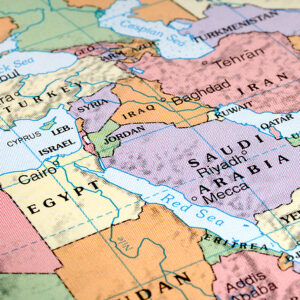Washington’s Middle East policy is a mass of confusion reflecting leaders’ and policymakers’ contradictions and misunderstandings, frankly uncertain of where to go and what to do about conflicting rivalries and interests.
The most significant Mideast country for the United States is Israel, whose security the U.S. guarantees with more than $3.3 billion a year in military aid, far more than any other country other than Ukraine. To keep the balance between Israel and its Arab neighbors, Washington also doles out more than $1.3 billion a year to Egypt, on the Mediterranean across Israel’s long southwestern border, and more than $500 million to Jordan, across the Jordan River from the Palestinians’ West Bank.
The United States is consumed by the war in Ukraine, into which Washington plunged more than $22 billion in military aid last year, but Israel is the fulcrum of American fears of Mideast conflicts fueled by Iran’s deeply anti-Israel policies and support for terrorist organizations to which Israel is the arch-enemy.
Washington pays lip service to the interests of Palestinians, with whom it has had complicated, up-and-down relations culminating in the closure of the Washington office of the Palestine Liberation Organization in 2018. The transfer during the presidency of Donald Trump of the American embassy from Tel Aviv to Jerusalem, divided between Israeli and Palestinian sectors, represented a triumph for Israel and a defeat of Palestinian dreams of serious international recognition as a separate geographical entity.
Shadowing American concerns about Israel are threats by Iran, an Islamic but not an Arab country, which sees Israel as its primary foe and has frequently vowed to destroy it. Because of these threats, Washington has focused on stopping Iran from developing nuclear warheads.
The Joint Comprehensive Plan of Action, signed in 2015 by Iran, the United States, the United Kingdom, Germany, and France, along with China and Russia, both hostile to the United States, was designed to strip Iran of the ability to go on developing nukes. Trump’s foolish decision to withdraw from the plan led to the resumption of Iranian efforts to “go nuclear.”
The ultimate danger of an Iranian nuclear state is that Iran would wage nuclear war against Israel. Not even Israel’s vaunted “iron dome” against aircraft or missiles carrying nuclear warheads can guarantee defense against attack. Israel would see a nuclear-armed Iran as a menace to suppress, if not destroy.
It’s entirely possible that Israel, which has its own unacknowledged nuclear program, would see a preemptive strike against Iran’s nuclear facilities as justified by the need for survival. For the same reason, Israeli warplanes in 2007 bombed and destroyed a nuclear reactor in Syria that North Korea was responsible for building.
For Israel, the overwhelming concern, other than persistent Iranian threats, is that most of the Arab world opposes the existence of the Jewish state and passionately supports the Palestinians. In the face of anti-Israeli sentiment, however, Israel formed diplomatic relations with neighbors Egypt and Jordan, and also has ties with the United Arab Emirates and Bahrain on the Persian Gulf and with Morocco and Sudan in northern Africa.
Pragmatic considerations undoubtedly have had much to do with Israel’s improved relations throughout the Middle East. Interestingly, Israel trades with Saudi Arabia, which has close ties with the United States despite American outrage over Saudi transgressions against basic human rights as in the murder of the Saudi journalist Jamal Khashoggi in the Saudi consulate in Istanbul, Turkey, in 2018.
Nonetheless, Israel still cannot overcome the hatred of its two northern neighbors, Syria and Lebanon, both of which bear the scars of bitter wars, including the Israeli invasion of Lebanon in 1982, a decade after the capture of the Golan Heights from Syria after Syria and other Arab nations invaded Israel.
The anti-Israeli terrorist group Hezbollah, supported by Iran, operates from Lebanon. Iran also extends its influence to Syria through militia groups. In Iraq, with the American military presence now down to a small advisory force of 2,500 troops, Iran has cultivated relations between its own Islamic Shiite majority and Iraq’s Shiite majority.
American indecision in the Middle East has been an overriding factor compromising Washington’s influence. The decision by George W. Bush early in his presidency to invade Iraq and topple Saddam Hussein was a mistake considering that Iraq did not have a nuclear weapons program, as claimed by Vice President Richard Cheney.
After pulling most American troops from Iraq, the next president, Barack Obama, failed to destroy Syrian facilities responsible for chemical attacks on rebel forces. Trump torpedoed the deal for getting Iran to stop working on nukes, and President Biden withdrew U.S. forces from Afghanistan, leading to the takeover by the Taliban.
The best that may be said for the American record in the Middle East is that it is highly mixed, while the Iran nuclear program, however, casts a long shadow over the region.

